|
|
|
|
|
| <> A living legend |
Although Edhi is a self-educated person, he has an instinctive feel of contemporary theories of Anthropology or Philosophy. He possesses the unique capability of reducing complex problems to simple forms, and producing workable practical solutions. His dress is as simple as his language, and working style.
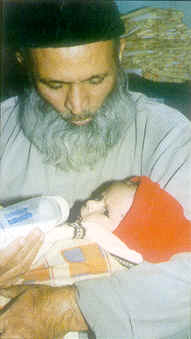
He is fond of destitute children and loves them like his own kith and kin. Finding those rare occasions to associate himself with them is a matter of immense pleasure for Edhi. He looks for such moments and whenever gets an opportunity to have their company, he fully enjoys it. Most probably this is the secret of his fine health even at the age of early seventy.
Women volunteers act as vital force in achieving Edhiís objectives. Edhi believes that women are more honest, hardworking and dutiful. "EDHI LADIES HOMES" which are permanent abode for teenage girls, provide education and vocational training within its compound. The concept of self-reliance permeates into Edhi organisation at every level.
Edhi has a fleet of 400 Pakistanís best organised ambulance service. Edhiís vehicles are the first to arrive at the scene of an emergency. When hijackers seized a Pan American jetliner at Karachi Airport, the authorities called Edhi for help. As negotiations dragged on whole day between hijackers and the Government, Edhi and his men with 64 ambulances stood - by at the scene. Late that evening, when hijackers began shooting passengers, and Pakistani commandos were storming the Aircraft, the ambulances dodged bullets to pick up the dead and the injured. Edhi personally carried the body Neerja Mishra, the Indian air hostess, who was later decorated for her bravery. With became a symbol and synonym for emergency service in Pakistan.
Edhiís achievements are unique in the sense that they are not funded by any religious, political group or by any government. When one of the Heads of state sent him a cheque of Rs. 0.5 million as a token of his missionary work, Edhi returned it.
During the past 45 years, Abdul Sattar Edhi has spent many sleepless nights ministering to the needs of his fellow Pakistanis. Whether they are peasants starving because of draught, babies abandoned on rubbish dumps or patients too poor to pay for their medical care Ö Edhiís compassion encompasses them all. Edhi has established an extraordinary social welfare network that helps thousands of Pakistanis each day Edhi says simply "It is a twenty hours job". Edhiís network is open round the clock without observing a single holiday.
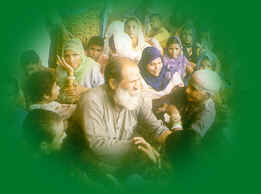
A short, strongly built man in early 70ís with a flowing beard and ready for any kind of emergency work round the clock. Throughout Edhi has been leading the simplest life. He is a teetotaller. He is ready to fly any where across the borders to reach any natural calamity or disaster within the shortest possible time. His food intake is generally based on taking pieces of stale bread in the morning , and raw cooked vegetables during a lunch-break. As a child, he was given two paisas daily by his mother. He was directed to spend one on himself, and give away the other to some one less fortunate than him .. He never forgot that simple lesson.
Edhi Organisation has a different touch if compared with other sister organisations. Most of other organisations go for easy tasks like rendering scholarships or distributing sewing machines etc. On the other hand all Edhiís work is throat catching as it has to respond quickly in serious situations and disasters.
| <> Historical Prespective |
Every society is destined to face the problems of looking after the welfare of the sick, the weak, the destitute and the needy. All societies are alike in this respect. One way of assessing the status of a society on the road to civilisation is the value accorded to an individual and his basic human needs. These have not always received the attention they deserve in the planning of economics, particularly in developing countries. Most of the available resources are consumed by defence needs and pressing demands for technological progress. Programmes for development in the social sector stay a long way behind mainly because of financial constraints. Special efforts are, therefore, needed to mobilise community resources to initiate and develop programmes for the welfare of the weak and the disadvantaged members of the society.
Sometimes it happens that a fortunate combination of the national situation and personal characteristics produce an individual with a capacity to understand the challenge and develop appropriate responses to this challenge. Such an individual in the case of Pakistan is Abdul Sattar Edhi, the Founder of Edhi Foundation.
Abdul Sattar Edhi was born in 1931 in a small village of Bantva near Joona Garh, Gujrat (India). The seeds of compassion for the suffering humanity were sown in his soul by his motherís infirmity. When Edhi was at the tender age of eleven, his mother became paralysed and later got mentally ill. Young Abdul Sattar devoted himself for looking after all her needs; cleaning, bathing, changing clothes and feeding. This proved to be a loosing battle against the disease, and her helplessness increased over the years. Her persistent woeful condition left a lasting impression on young Edhi. The course of his life took a different turn from other persons of his age. His studies were also seriously affected and he could not complete his high school level. For him the world of suffering became his tutor and source of wisdom.
Edhiís mother died when he was 19. His personal experience made him think of thousands and millions, suffering like his mother, around with nobody to look after them. He thought that he had a call to help these people. He had a vision of chains of welfare centres and hospitals that could be opened to alleviate the pain of those suffering from illness and neglect. He also thought of the in-human treatment meted out to the mentally ill, the insane and the disabled persons.
Even at this early age, he felt personally responsible for taking on the challenge of developing a system of services to reduce human miseries. The task was huge he had no resources. But it was some thing that he had to do even if he had to walk to the streets if he had to beg for this purpose.
Edhi and his family migrated to Pakistan in 1947. In order to earn his living, Abdul Sattar Edhi initially started as a peddler, later became a commission agent selling cloth in the wholesale market in Karachi.
After a couple of years, he left this occupation and with the support of some members of his community decided to establish a free dispensary. He became involved in this charity work. However, soon his personal vision of a growing and developing system of multifarious services made him decide to establish a welfare trust of his own and named it as "Edhi Trust".
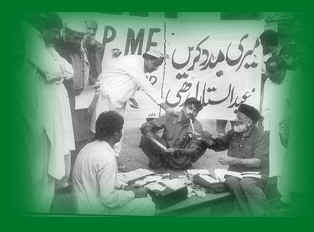
An appeal was made to the public for funds. The response was good, and Rs.200,000/- were raised. The range and scope of work of Edhi Trust expanded with remarkable speed under the driving spirit of the man behind it. A maternity home was established and emergency ambulance service was started in the sprawling metropolis of Karachi with a population of over 10 million.
More donations were received as peopleís confidence in the activities of the Trust grew. With the passage of time, masses gave him the title of the" Angel of Mercy."
Abdul Sattar Edhi was married in 1965 to Bilquis, a nurse who worked at the Edhi dispensary. The couple have four children, two daughters and two sons. Bilquis runs the free maternity home at the headquarter in Karachi and organises the adoption of illegitimate and abandoned babies. The husband-wife team has come to share the common vision of single minded devotion to the cause of alleviation of human sufferings and a sense of personal responsibility to respond to each call for help, regardless of race, creed or status.
Edhi involves himself in every activity at Edhi Foundation from raising funds to bathing corpses. Round the clock he keeps with him an ambulance which he drives himself and makes rounds of the city regularly. On finding a destitute or an injured person any where on the way, he escorts him to the Relief Centre where immediate attention is given to the needy person. Inspite of his busy work schedule with the Foundation, Edhi finds enough time to spare with the residents of the orphanages called "Edhi Homes". He is very found of playing and laughing with the children. A short strongly built man in his early seventies with a flowing beard and a ready smile, Edhi is popularly called "Nana" (Grandfather) by the residents of "Edhi Homes".
Despite his enormous fame and the vast sums of money that passes through his hands, Edhi adheres to a very simple and modest life style. He and his family live in a two room apartment adjacent to the premises of Foundationís headquarter. Neither Edhi nor Bilquis receives any salary. They live on the income from government securities that Edhi bought many years ago to take care of their personal needs for the rest of their lives, thereby freeing them to devote single mindedly to their missionary work.
He shuns publicity for the fear of becoming haughty. As the credibility and fame grew and the name of Edhi became a house-hold word, people started approaching him for becoming chief guest on special occasions.
In an interview given to a journalist in Lahore in 1991, Edhi said,"I want to request the people not to invite me to social gatherings and inaugural ceremonies. This only wastes my time which is wholly devoted to the well being of our people."
Although Edhi has a traditional Islamic background, he has an open and progressive mind on a number of sensitive social issues. He strongly supports the notion of working women. Of the 2,000 paid workers of the Edhi Foundation around 500 are women. They work in various capacities in-charges of Edhi centres, heads of maternity homes and dispensaries and office workers. More-over, several women volunteers help Edhi Foundation in fund raising. Edhi encourages women to do all sorts of work without differentiation.
A. Sattar Edhi has spent over 45 years of his life in the service of humanity. He as established, more or less single handedly, a national welfare network, the Edhi Foundation (EF), which operates from a small headquarter, in a poor locality of Karachi.
The simplicity of central office is amazing in view of the wide range of the nation-wide services co-ordinated by Edhi personally with the help of telephones and a handful of assistants. It is, therefore, not easy to manage the strange mixture of complexity of operations and use of administrative communication channels with the limited staff. This has inevitably resulted in the centralisation of policy decisions.
However, with the general spread of the services to all parts of the country and an increasing awareness of the public, the way has been paved for greater involvement of communities in the management of welfare services. Edhi displays a remarkable stamina and energy at the advanced age of seventy to keep himself informed about all activities of the Foundation in all parts of Pakistan. He travels in Pakistan and abroad extensively for this purpose and conveys a feeling of being there, when needed.
Edhi Foundation is a story of constantly evolving enterprise, infinite faith in the Almighty, perseverance and dedication of its founder. There are many ways in which the benefits of the missionary work of Edhi Foundation can be highlighted:
The broad ideological base provided by these aspects of the Foundationís work has helped to develop several innovative approaches for community welfare services in Pakistan, which include
The dynamic nature and the range of social services provided by Edhi Foundation makes it different from other similar organisations in Pakistan and abroad. No other welfare organisation in the country is as active at the grassroots level as is the Edhi Foundation.
The Foundationís activities include a 24 hours emergency service across the country through 250 Edhi Centres which provide free shrouding and burial of unclaimed dead bodies, shelter for the destitute, orphans and handicapped persons, free hospitals and dispensaries, rehabilitation of drug addicts, free wheel chairs, crutches and other services for the handicapped, family planning counselling and maternity services, national and international relief efforts for the victims of natural calamities. Currently, the Foundation is a home for over 6,000 destitute, runaways and mentally ill, and it provides free dispensary and hospital services to over 1,000,000 persons annually in addition to 45 other wide ranging services.
Edhi strongly adheres to the principle of self-help. It is hard to think of any welfare organisation or a non-governmental organisation, sustaining its functions while refraining from soliciting financial support from the government and foreign aid-giving agencies. It is even harder to understand the active such a rejection of the concept of support. All donations for Edhi Foundation come from individuals and a few business enterprises.
The principle of self-reliance not only saves the government a sizeable amount of money, but also helps in changing the culture of dependence on government and foreign agencies for meeting public needs. This notion of self-help is inculcated in all Edhi Centres and their activities. A large number of women trained in Edhi nursing homes in Karachi, initially had approached Edhi Foundation for charity. However, they were persuaded to undergo the nurse training and to become independent. While undergoing training, they are paid a stipend.
Similarly, in Edhi Homes for destitute children, the residents are trained and motivated to do their own work. Some of them are paid token monthly wages for learning vocational skills. Even in the home for the mentally retarded, there is a very small staff. The relatively less handicapped persons are trained to look after the severely handicapped one.
Edhi Foundation has also been innovative in providing some unconventional welfare services despite severe social and cultural opposition. The Jhoolas (Cradles) is a fine example of the use of imagination and social consciousness creatively. Baby cradles are installed near most emergency Edhi Centres where unwanted children can be abandoned without disclosing any identity.
This service addresses a serious problem faced by the society, and demonstrates that, with imagination and determination one can resolve even the most difficult and sensitive issues. In providing this service, Edhi had to face stiff opposition from many quarters. Some groups and individuals viewed the "Jhoola" service as an encouragement for illegitimate child births. However, to Edhi, the cradles save people from committing even a more heinous crime of leaving their unwanted babies to die in the rubbish dumps.
evelopment and management of the nation-wide services of a diverse nature demanded a highly parsimonious and economical system. The means through which the efficiency and effectiveness of Edhi Foundationís operations is ensured, includes:
Edhi highway centres are a fine example of this approach where community centres are being established on highways across the country at every 25 kilometres. Edhi Foundation plans to spend the money raised within a city and develop services in the same city through local funding. Through this mode each city will not only be able to identify with the project, but also develop a sense of healthy competition with other cities to raise more funds.
With exemplary tenacity, Edhi has pursued his mission for the last four decades. He has quietly brought about a remarkable change in the social attitudes in Pakistan towards community welfare by instilling in ordinary citizens a consistent desire to participate in public welfare programmes. Mission of service to humanity knows no barriers of religion, caste, creed or national boundaries.
Edhi Foundationís network has now extended beyond its national boundaries and acquired an international charter. With its international operations, Edhi is also setting up good examples for other countries to follow and provide better welfare services to the people, especially those of Third World countries. By dedicating his life to the service of humanity, he has not only rendered invaluable services to the needy in Pakistan and other countries, but has also demonstrated how ordinary citizens of the world can develop exemplary models of social services, which even governments and international agencies have found difficult to emulate or duplicate.
Edhi has shown that a single individual has the potential to bring about the desired change at national and international levels.
The mission of Edhi Foundation is to motivate the people of Pakistan and other Third World countries, to solve their social and other problems on self-help basis. Abdul Sattar Edhi believes that the separation of voluntary efforts from the state is necessary in the area of welfare.
Firstly, it is impossible to provide through the state even barest minimum welfare cover to the people due to continuous financial and resource constraints.
Secondly, Edhi believes that reliance on agencies of the state breeds dependence. He aims to establish a social welfare system in Pakistan which is self-supporting and has the capacity to respond to human needs.
Edhi emphasises the importance of safeguarding the basic human rights, regardless of "religion, caste or creed" "My religion is humanitarianism which is the basis of ever religion in the world.", Says Edhi. He has persisted upon his mission of humanitarianism for the past forty five years, and is therefore popular among followers of all the existing religious sects in Pakistan.
| <> Management Style |
EFFECTIVE MANAGEMENT STYLES
The following are some of the salient features of the effective management style of Edhi Foundations.
Communication Network
Edhi Foundation is equipped with the state-of-the-art-communication equipment. The nerve centre is in Karachi. Other cities are connected with it by means of radio and telephone links.
An increasing number of ambulances are being Linked with mobile wireless network. The communication network plays a key role in effective running of various welfare services, and it enables Edhi to exercise full control over the Foundationís activities across the country.
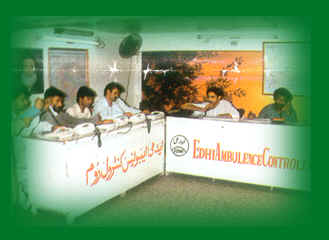
The communication network is a reliable means of updating information on road accidents and other emergencies in the country. The national press and a number of government agencies including the police are in constant touch with Edhi Foundationís main communication centre in Karachi called the "Control Tower". This is an example of government and Foundation working together in harmony.
In order to further facilitate in attending an emergency call, Edhi Foundation has been able to obtain an emergency dialling facility (115) from the Telephone Department. The subscriber gets connected automatically to the nearest Edhi Emergency Centre. The emergency dialling(115) facility is in operation in all the big cities of Pakistan.
Zonal set-up
Edhi Foundation publishes a "Welfare Journal" from New York on monthly basis. Another weekly news letter is published from Karachi covering important emergency activities of the Foundation. Computers have been installed at various important Centres to compile information and provide feed-back to the mass media, specially the daily press. In Pakistan, Edhi Foundation has eight major administrative zones located in Karachi, Hyderabad, Sukkur, Mirpur Khas, Multan, Faisalabad, Islamabad and Quetta. Zones are further sub-divided into various "Circles".
Zonal heads look after all Edhi Welfare services in their areas. These services include emergency Edhi Centres, free dispensaries, hospitals, maternity homes, child homes, and girls hostels. Zonal heads report to the head of administration based at Karachi headquarters.
In Karachi, there is also the main information bureau of the Edhi network. Mrs. Bilquis Edhi handles administrative issues relating to child homes, maternity homes, girls hostels and nursing homes. Edhi maintains an overall control on various activities of the Foundation.
Monitoring And Control
The finances are exclusively controlled by Abdul Sattar Edhi and his wife, Bilquis. The accounts of all centres located in different cities are managed by accountants based at zonal offices and the Edhi Headquarters in Karachi. These accounts are audited every year.
Strict control is exercised in collection of cash donations. Edhi Centres and institutions issue receipts in duplicate to the donor for all cash donations. The donor is given a stamped addressed envelope which he uses for sending one of the two receipts to the Edhi headquarters in Karachi. According to Edhi, ninety five percent of the cash receipts are sent to the headquarters by the donors. This provides an effective control on workers receiving cash donations at various centres.
For expenditures, administrators of Edhi Centres and institutions fill in an expense sheet every week and send it to their Zonal heads, who in turn prepare expense summary reports for all centres.
The summary reports together with expense vouchers are sent to Head Office every week. These reports are scrutinised by the Head of Administration. Final verification is done by Abdul Sattar Edhi who makes payment by cheques to the Zonal Heads. They in-turn make disbursements to the respective centres.
At Edhi Foundation, every effort is made to spend all contributions on the needy people directly. A very nominal expenditure of the Foundation is towards administration
| <> Resources |
Problems faced by the developed and the developing countries in the area of welfare services demand radically different approaches. Whereas, the developed countries are putting the responsibility primarily on the government, the developing countries are struggling to mobilise their own resources or look for foreign assistance for this purpose.
At best, it is to be hoped that there could be co-ordinated efforts between the private and the public sector for provision of the needed welfare services through the most economical and effective use of financial, human and technical resources. Edhi Foundation has been successful in developing a model of welfare services in a large number of areas where the Foundation supplements and supports the government system by mobilising community resources without burdening the public exchequer.
In actual practice, the organisational set-up of the Foundation has been constantly in the process of shaping itself to suit the requirements of its ever expanding network of services. Being outside the formal bureaucratic set up, it has the plasmatic flexibility to mould itself in response to the exigencies of the situation.
VOLUNTEER BASE
Edhi Foundation is run entirely with the help of volunteers. There are around two thousand Volunteers, comprising zonal heads, workers at several Edhi Homes, clerks at the Edhi Centres, workers at Maternity homes and drivers for the ambulances. Although these Volunteers get subsistence allowance for their services, the compensation is not in the form of salary. According to Edhi, this "Volunteer System" results in deep commitment on part of the workers and simultaneously minimises administrative and over-head expenses.
This compensation system is also beneficial for the volunteers who can add to their income by putting in more hours besides their other regular jobs.
In addition to the paid volunteers, there are thousands of others who offer their services without any payment or reward, and participate in social work on full time or part time basis. Such voluntary work takes many forms. The dispensaries are served by doctors and other professionals. Vehicles are operated by Volunteers. Architectural, engineering, legal and financial services are often available on gratis basis. Volunteers collect and deliver food, clothing, medicines and other emergency supplies.
The Foundation has no problem in enlisting social workers for its help in its various activities. People from every profession and walk of life offer their services free of charge. Since most of the Volunteers belong to the lower and middle class, it is easier for them to identify with the needs of the people. For enrolling Volunteers preference is given to retired officers of armed forces, retired school teachers and officers belonging to postal service to work in rural areas. The under lying idea behind this approach is to reach the masses in rural set-up avoiding sectarian and political controversies making the system more radical and direct.
This is one of the key ingredient of Foundations success. All Edhi Homes and Edhi Child Homes, which admit thousands of destitute, mentally retarded persons and orphans, are being run entirely by the inmates of these Edhi Homes. They are provided with not only shelter and food but also a purposeful life. Both the paid and unpaid purely voluntary workers play a critical role in Edhi Foundationís success. They perform their duties in an environment which is generally hostile and full of stress. The clerks attending emergency calls at the main control room in Karachi listen to distress messages everyday in a congested and noisy work environment. The control room is located in a very busy area of Karachi. The administrators and other workers at Edhi Homes have to live with destitute, orphans and mentally handicapped persons. Similarly, attendants and ambulance drivers at Emergency Edhi Centres operate from a small booth, often housed in a small tent.
Despite all these difficulties, Edhi workers display real and positive motivation. They all seem to draw satisfaction from their work and take pride in their being part of a pioneering team in a challenging field. The ordinary socio-economic background of most of Edhi workers, their sense of being part of a noble mission, the compensation A system and a Dove all the leadership provided by the founder instils a strong driving spirit for an efficient Edhi work force.
DONATIONS
Voluntary donations from individuals ranging from Rs. five to many hundreds of thousands of rupees, support the Foundationís activities. The emphasis is on individual social commitment from the masses. Contributions are also made in kind, in the form of food, clothing, medicines, animal hides and skins. Medical supplies and technical support are also received from several non-governmental organisations. The annual donations are fairly regular and reliable because they are broad based, not linked to narrow interest groups.
Most of the donations come from past beneficiaries of the Foundationís activities. Edhi Foundation raises funds from Pakistanis living abroad in thirteen different countries.
However, ninety percent of the donations come from within Pakistan. The value of the pure voluntary services is not quantified in the financial records, but it is a significant part of the organisationís strength. Support from larger organisations and business community is readily available, but tapped only occasionally and most judiciously in order to retain the deep private and personal commitment that has been critical to the success of this Foundation. Donations from the government, religious organisations and relief agencies are not accepted. Abdul Sattar Edhi firmly believes that since the Foundationís work is for the " Awam" (Masses) ,the Awam should contribute towards its operations. Through this principle of self- reliance, he wishes to inspire the masses for welfare projects. Aid from government and foreign agencies, in Edhiís view, leads to undesirable interference and creates administrative bottlenecks in the organisationís work.
Cash donations are collected at the Edhi Centres and at Edhi Headquarters. Donations are also received by mail. Quite often Mr. Edhi launches fund raising campaigns and makes collections standing on pavements and busy road junctions. For his frequent appearance in this role, Edhi has become a familiar figure to the general public as a known champion of the noble cause. He has, on several occasions, gone to the streets, cap in hand to collect funds for treatment abroad of seriously ill patients.
Donations in kind are received at various centres of Edhi network including Edhi Centres, Homes, Edhi hospitals, maternity homes and the Headquarters.
All donations and record of accounts are audited properly through a firm of Chartered Accountants. The statements of accounts are presented to the Federal Government for grant of tax relief by Central Board of Revenue. Another system of internal check and audit of accounts on weekly basis is in operation within the system.
MANAGEMENT STYLE
Management of all funds is centralised, and remains in the exclusive control of Edhi and his wife who are personally involved in all forms of operations of the Foundation. They are associated with the raising of funds from home and abroad. Edhi himself drives an ambulance makes rounds of the city and goes for surprise checks of various centres. His omnipresence is not only a source of motivation for the workers but also a means of keeping a constant vigil on the ground operations.
Edhi is very strict about any lapse in service. He personally gets involved if any complaint is received and takes corrective measures on the spot. He also keeps guiding his workers to ensure compliance with the procedures. Instructions are given verbally telephonically, through written communications and on wireless network.
Edhi is averse to procedural obstacles in carrying out the functions of his organisation. He takes action first, and deals with the relevant paper work and other details later. For example, on several occasions tents were installed in emergency and welfare services started immediately without waiting for the procedural approval for the use of sites for the Edhi Centres. However, after initiating the services, prompt efforts were made to regularise it fully.
| <> Details of Services |
From Cradle to Grave
JHOOLAS (BABY CRADLES)
At most of the emergency Edhi Centres, "Jhoolas" (baby cradles) are installed where unwanted infants can be left. These abandoned babies are then taken into custody and given shelter in Edhi Homes. Although initially Edhi was subject to a lot of pressure from several quarters on initiating Jhoola service, gradually the idea caught on.
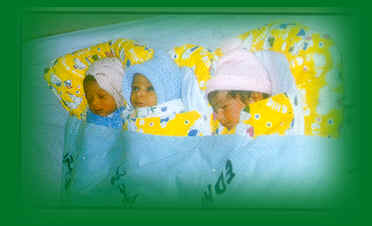
Now people even come forward to hand over the babies themselves to officials at the Edhi Centres. Such infants are thereafter given in the care of suitable deserving families not having children of their own, for adoption. Mrs. Bilquis Edhi, the head of this service through a centralised system checks the credentials of the adopting parents and conducts a regular follow-up.
Babies left over in garbage dumps outside Karachi are air-lifted to the central nursery located in Karachi where medical and nursing care is provided before adoption. All documentationís of this service are kept confidential in order to save the child from facing social problems afterwards.
DESTITUTE HOMES
Edhi Home also called as" Apna Ghar" ( our home), is a home for the mentally ill destitute, for orphans and runaways. There are 13 such homes in the country out of which seven are in Karachi. About six
Thousand persons live in Edhi Homes. A destitute or homeless becomes a member of Edhiís family once he enters its premises. All boarding, lodging, clothing, and logistic arrangements are entirely free.If a person dies within these homes, the burial arrangements are made by the Foundation according to the religious rites of the deceased (Muslim, Hindu, Sikh, Christian, or any other religion).

WELFARE CENTERS
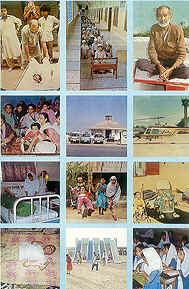
Under this project, it is planned to construct five hundred Edhi Centres in order to cover a sizeable population on all highways and major link-roads of Pakistan in a properly phased fashion. The existing centres provide first aid to accident victims and arrange for their speedy transfer to the nearby hospitals. More-over, these centres are being used for providing medical facilities in rural and semi-urban areas. Also they provide ambulance service at nominal charges, facility for vaccinating new-born babies and children against diseases, and other welfare services. The dispensary and mobile dispensary at each centre cater for medical assistance to approximately two hundred and fifty patients daily.
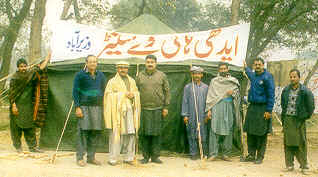
WARE HOUSES
Voluntary contributions in kind, which include clothing, edibles, medicines, dry rations are received throughout Edhi Centreís network. Through voluntary contributions from Pakistan and abroad, Warehouses were established in big cities like Karachi, Islamabad, and Multan. Five of these Warehouses are kept ready round the clock with provision of tents, dry rations, bedding, blankets, baby milk powder, utensils, etc., to move into action immediately in times of emergencies.
These Warehouses deliver items to refugee camps, at the site of any natural calamity, riots, fires and accidents, etc. Through these Warehouses regular supplies have been provided to refugees from Kashmir, Afghanistan, Bosnia and countries like Somalia, Kuwait, Bangladesh and flood affected areas in Pakistan etc.
FIELD AMBULANCE SERVICES
Thousands of persons are disabled or killed in minor or major road accidents throughout Pakistan. After any major accident, the seriously injured persons lie on the site for several hours waiting for shifting to the nearest hospital. Often, delay and apathy cause loss of valuable lives, leaving many others injured, crippled and handicapped.
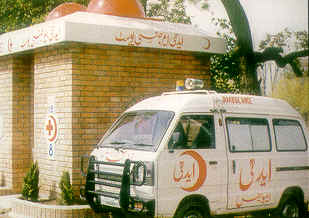
AIR AMBULANCE SERVICES
The Foundation has set up a helicopter and fixed wing aircraft-based emergency service centred at Karachi to supplement the field services.
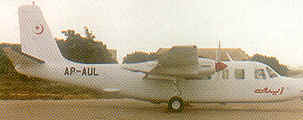
- Evacuation of serious casualties from the sites of accidents, riots and calamity affected areas.
- Transportation of Physicians and Specialists to remote areas. Experience indicates that even volunteer surgeons cannot be expected to travel twelve to eighteen hours by road as required in many cases. An air ambulance addresses this problem and enables full utilisation of the volunteer capacity available to the Foundation. Inter-hospital transfer of patients requiring specialistís treatment and immediate attention.
- Quick transportation of blood and human vital organs.
- Search and rescue of stranded people in deserts, mountains, floods and coastal areas.
- Geological surveys of underground water in the famine-stricken areas of Thar, Chohistan and Utthal.
- Medical and other assistance to companies/organisations carrying out exploration/research in remote areas of the country.
- Air-dropping of food supplies for stranded people on ships, and in areas affected by wars and calamities.
MARINE AND COASTAL SERVICES
Having developed the nation-wide network of ground ambulances supported by Air ambulance, Edhi Foundation has set up a separate establishment to extend its services in coastal areas as well.
Edhi Marine service caters for the following:
BLOOD AND DRUG BANKS
Provision of blood in order to save human lives remains an essential element of emergency services. In major accidents, natural calamities and bomb blasts, etc., blood is supplied to the needy on an emergency basis.
All welfare centres of major cities in Pakistan regularly keep an updated list of donors of all blood groups and conduct campaigns for enlisting more donors for collection of blood.
Blood is pooled in hospitals from the volunteer donors and is provided free of cost in cases of heart surgeries and other major operations to poor patients. Two Blood Banks, one at Karachi and the other at Mirpur, have proper facilities for storing and screening blood, from where hundred of pints of screened blood is being regularly dispensed to the government hospitals.
CANCER RESEARCH HOSTEL, KARACHI
During 1980, realising the needs of poor cancer patients in the city who were pouring in from up-country the Foundation developed a separate project for the establishment of a cancer hostel near Agha Khan Hospital, Karachi. Suitable premises have been purchased to house 50 cancer Patients with treatment facilities. This Centre acts as an extension bay of Radiotherapy and Oncology Department of Jinnah Post-Graduate Medical Centre, and provides terminal care and treatment to poor cancer patients of both sexes of all ages with indoor and outdoor facilities. The radio-therapy and diagnostic oncology is taken care by the experts of Jinnah Post-Graduate Medical Centre, while all other remaining medical facilities are provided within the Cancer Research Hostel. Plans are under way to extend this facility with an additional one hundred and fifty beds at Karachi. Poor patients who can not bear their travel expenses are provided railway tickets making it easier for them to reach the cancer hostel.
MISSING PERSONS SERVICE
Because of social problems a large number of children leave their homes or get separated from their families during emergencies. Similarly, mentally handicapped people who canít get back to their homes, wander around the streets. Edhi Foundation either uses its own wireless network, state radio and T.V. channels or arranges local announcements, advertisements in the press, and thereby manages to return thousands of such people to their homes.
Similarly, unidentified dead bodies are kept in cold mortuaries and all efforts are made to identify the next of kin. This service is also available to Pakistanis living abroad and is being co-ordinated through Pakistan Embassies or offices of the Foundation abroad.
EDHI HOMES FOR SHELTER OF ANIMALS
Edhi Homes were originally meant to provide services to the distressed and ailing destitute. Soon, however, animals that were cruelly treated by their owners and had become lame or crippled or badly wounded, started ending up in Edhi Centres. These also include missing animals and unwanted house pets which have no other place to go except Edhi shelters. In view of the increasing number of such animals, Edhi Foundation established a separate treatment unit which has now grown up into a small zoo. Veterinary doctors look after these animals along with other volunteer staff at Super Highway, Karachi. In addition, another similar facility is established at Korangi, Karachi. These animals include peacocks, owls, deers, monkeys, horses, mules, cats, and a number of domestic birds.
GRAVE YARD SERVICES
Edlhi Foundation has the largest net-work for the burial of unclaimed and burials of dead bodies in Pakistan. Separate grave yards are established in cities like Karachi, Lahore, Rawalpindi and New York. Mr. Edhi, perhaps, holds the world record for giving the last prescribed bath (Ghusal) with his own hands to about 20,000 unclaimed dead bodies and for arranging their burial.
Metropolitan Corporations of all big cities in Pakistan like Karachi, Lahore and Rawalpindi have made annual contracts with Edhi Foundation for burial of unidentified dead bodies recovered from drowning, homicides, and accidents.
Coffin cloth and coffin boxes are provided free of cost to those families who cannot afford or manage burial rites themselves. Non-Muslims are provided services according to their own religious rites with the assistance of a church or local temple. In addition to the above, large air conditioned cold mortuaries have been established at Karachi to keep unidentified bodies for a couple of days, and perform burial rites if the next of kin is not traceable.Edhi grave yard services also provide facilities for burial and transportation of dead bodies from overseas.
EDHI EMERGENCY POSTS
Edhi Emergency Posts have been established at National and Provincial Capitals including Karachi, Lahore, Islamabad, Rawalpindi, Peshawar and Multan. The aims these posts are to:
- Reach the site of emergency within minutes
- Launch mass campaign against social evils like Narcotics, Aids, and awareness for Diarrhoea, Immunisation and Family Planning programmes etc.
- Provide routine emergency coverage to public gatherings and processions.
- Act as a focal point for civil defence in time of need.
- Provide guidance to the passers-by in locating their required address.
- Assist illiterate people for filling in different forms pertaining to Banking and Identity Cards etc. and help them in letter-writing.
- Organise local volunteers in social welfare activities.
- Extend other services of Edhi Foundation to door-steps of the needy families.
PRISONERS AID
Following services besides legal aid are provided by Edhi Foundation to prisoners in different jails and remand homes
- Food supplies. (Borstal and Central Jails)
- Medical Facilities. (Karachi Central Jail)
- Gifts (on national events) on yearly basis.
- Distribution of books and stationery.
- Recreation. (sports, TV, etc.)
- Provision of items of daily use like wall clocks, articles of clothing and blankets, etc.
- Ambulance services.
- Securities and bonds for release of prisoners involved in minor crimes.
REFUGEES ASSISTANCE
Edhi Foundation has been providing services to the refugees of different countries forced to take shelter in Pakistan. Refugees belonging to the following countries are among the beneficiaries:
1. Afghanistan 2. Kashmir 3. Bosnia 4. Iraq 5. Burma 6. Nepal 7.Bangladesh 8. Somalia 9. Uganda
INTERNATIONAL COMMUNITY CENTRES
The work of Edhi Foundation has extended beyond Pakistan. Currently, branches of Edhi International Foundation are providing regular services in New York, Ontario, Dacca, Tokyo, Sydney, London, Dubai, while preliminary work for establishing branches in Afghanistan, India, Sri Lanka, Yemen and Russia has been completed. These International Community Centres look after the welfare of Asians abroad.
Their activities include:
Burial of dead bodies, financial and moral support to the needy people visiting foreign countries for medical treatment, assistance in restoring lost and runaway children to their families, co-ordination and distribution of relief aid outside Pakistan, and drug abuse rehabilitation service.
COLLABORATION WITH OTHER ORGANIZATIONS
Besides running its own fleet of ambulances, Edhi Foundation has been supporting other government institutions and non-governmental organisations in a variety of ways, keeping in view the larger interest of the masses.
A list of organisations receiving ambulances as donations from Edhi Foundation is given below:-
- Ministry of Health, Sindh Ojha TB Sanatorium, Karachi.
- Civil Hospital, Hyderabad.
- TB. Centre, Kotri.
- Liaquat Medical Hospital,íJamshoro.
- Trust for Destitute People, Hyderabad.
- Memon Hospital, Hyderabad.
- Government Hospital, Shikarpur
| <> Expansion Plans |
Edhi Homes for the Destitute
The establishment/extension of additional Edhi Homes for the destitute during next three years is planned for all major cities.
Peshawar Quetta, Muzaffarabad, Chitral, Gujranwala and Lahore. The estimated cost of the above facilities is over Rs.100 million.
Rehabilitation Centre for Heroin Addicts
Rehabilitation and associated training centres are planned for learning skills. A ball point manufacturing plant will be established at Super-Highway, at a cost of Rs.2.5 million. This is in addition to the drug abuse rehabilitation programme already in Operation
Ambulance Centers And Associated Ambulances
The number of ambulances will be increased from existing 400 ambulances to 650 ambulances over the next two years. The total cost of ambulance Centres and associated ambulances will be approximately 56 million.
Rural Centers
Rural Welfare Centres will be established to organise medical and other aids to the poverty and drought stricken areas of Utthal in Baluchistan, and Thar and Cholistan in Sindh. These centres will supplement the Foundationís relief centres already in Operation.
Edhi Community Centers
In its next phase of development, Highway Centres, which are mainly located in rural areas, shall be converted into community centres to create awareness regarding literacy, health, sanitation, safe drinking-water and immunisation. The programme will also support the community for solving their problems on self-help basis. Small loans will be granted for poultry farming and cattle breeding through Edhi Community Centres.
Establishment of Specialised Centers for Treatment
For treatment of renal problems and poor cancer patients, the Foundation hopes to build specialised hospitals and surgical units in Pakistan.
Ambulance Aircraft
Five additional ambulance aircraftís will be acquired within the next three years. This will include 2 helicopters and 3 Fixed Wing aircraftís.
Construction of Hospitals at Every 100 Kilometers
During accidents on highways, deaths occur due to non availability of timely medical treatment. The Foundation hopes to build traumatology centres during the next three years at every 100 kilo meters to save precious lives.
Edhi Public Kitchen
Edhi Foundation hopes to build public kitchens in major cities of Pakistan and in Third World countries during the next three years for basic food supplies to the poor, needy and drought-stricken areas.
Establishment of Reserve Funds
In order to run Edhi services and meet recurrent expenditures on long-term footing, the Foundation hopes to raise Rs.400 million within the next five years as a reserve fund which will act as a fixed deposit base. These funds will be generated through community efforts.
| <> International Services |
Edhi International Foundation with its branches in U.S.A., England, Japan, Bangladesh, U.A.E., and Canada, are engaged in humanitarian work, supporting especially people belonging to Third World.
| <> International Offices |
U.S.A
Edhi International Foundation,
42-07 National Street
Corona, New York, 11368
U.S.A.
Tel: (718) 639-5120
Fax:(718) 335-1978
UNITED KINGDOM
Edhi International Foundation,
7 Shakespeare Road,
Finchley , Central London N3 IXE,
United Kingdom
Tel: 020-8346-9232 and 020-8349-0296
CANADA
Edhi Charitable Foundation, Inc.
100 Mc Levin Avenue
Scarborough, Ontario B2V5,
Canada
Tel/Fax: (416) 293-4899
JAPAN
Edhi International Foundation
RM 101 COPO Nikkei,
1-25 4-Chome
Minami-Ohi Shinagawa Ė KU
Tokyo 140
Japan
AUSTRALIA
Abdul Sattar Edhi International Foundation
Level 20, Picadly Tower,
133 Castle Reagh Street,
Sydney 2000
Australia
Ph: 02-2646499
Fax: 02-264-7337
BANGLADESH
Edhi International Foundation Inc.
2/2 Purana Palton, 3rd Floor
Dhaka-1000
Bangladesh
| <> Awards |
International Awards
National Awards
| <> Contact Details |
| City |
City Code |
Telephone Number |
|
|
Ahmed Pur |
0698 |
72014 |
|
|
Attock |
0597 |
4876 |
|
|
Bahwal Nagar |
0631 |
2236 |
|
|
Bahwal Pur |
0621 |
881204 |
|
|
Basti Malook |
- |
Wireless |
|
|
Bhai Phero |
04943 |
115 |
|
|
Burhan |
- |
Wireless |
|
|
Chicha Watni |
0445 |
2838 |
|
|
Chiniot |
0466 |
331599 |
|
|
Daska |
04341 |
2227 |
|
|
D.G. Khan |
0641 |
65161 |
|
|
Dina |
0541630 |
878 |
|
|
Faisalabad |
0411 |
610111 |
|
|
Gujranwala |
0431 |
257806 |
|
|
Gujrat |
04331 |
27161-4239 |
|
|
Islamabad |
|||
|
* Ambulance Control |
051 |
251191-827844 |
|
|
* Edhi Home |
051 |
251047 |
|
|
Jhang |
0471 |
622305 |
|
|
Jhelum |
0541 |
2289 |
|
|
Kamalia |
0463 |
411940-411362 |
|
|
Kamoke |
0435 |
2030 |
|
|
Kasur |
- |
Wireless |
|
|
Khan Bella |
(Book Call) |
168 |
|
|
Khanewal |
0692 |
54164 |
|
|
Kharian |
05771 |
2983 |
|
|
Lahore |
|||
|
* Ambulance Control |
042 |
440159-444460 |
|
|
* Edhi Home |
042 |
879193 |
|
|
Lalamusa |
04348 |
2499 |
|
|
Manga Mandi |
- |
Wireless |
|
|
Mandra |
0571 |
591183 |
|
|
Mian Channu |
0448 |
3524 |
|
|
Mianwali |
0459 |
32114 |
|
|
Multan |
061 |
34938-583906 |
|
|
Okara |
- |
Wireless |
|
|
Pattoke |
04942 |
421615 |
|
|
Perowal |
- |
Wireless |
|
|
R. Y. Khan |
0731 |
70950 |
|
|
RAWALPINDI |
|||
|
* Ambulance Control |
051 |
422319-533333 |
|
|
Saidqabad |
0702 |
75919 |
|
|
Sahiwal |
0441 |
61234 |
|
|
Sargodha |
0451 |
723593 |
|
|
Sialkot |
0432 |
553211 |
|
|
Taxila |
0596 |
3010 |
|
|
Toba Take Singh |
0462 |
510005 |
|
|
Wazirabad |
0437 |
3155 |
|
|
Zahir Peer |
0731 |
62565 |
|
| SINDH | ||
|
Badin |
0227 |
62215 |
|
Dadu |
0229 |
3891 |
|
Digri |
023221 |
366 |
|
Diplo |
- |
Wireless |
|
Dhabeji |
- |
Wireless |
|
Hala |
0228 |
2213 |
|
HYDERABAD |
||
|
Ambulance Control |
0221 |
20090 |
|
Islamkot |
- |
Wireless |
|
Jacobabad |
0721 |
3805 |
|
Jamshoro |
- |
Wireless |
|
Jhuddo |
023231 |
368 |
|
Kandhiaro |
07093 |
227 |
|
KARACHI |
||
|
* Ambulance Control |
021 |
204800-205656 |
|
* Edhi Village |
021 |
Wireless |
|
Khair Pur Mirs |
0792 |
4417 |
|
Kotri |
0221 |
870855 |
| Larkana |
0741 |
41921-40299 |
|
Matli |
02238 |
753 |
|
Mirpur Khas |
0231 |
61344 |
|
Mithi |
02342 |
424 |
|
Moro |
0752 |
2606 |
|
Nangar Parker |
- |
Wireless |
|
Nawabshah |
0241 |
64000 |
|
Noriabad |
- |
Wireless |
|
Nowsheroferoze |
- |
Wireless |
|
Pano Aqil |
- |
Wireless |
|
Qazi Ahmed |
02235 |
757 |
|
Rani Pur |
07051 |
501 |
|
Saeedabad |
02298 |
308 |
|
Sanghar |
0225 |
41220 |
|
Sehven Sharif |
02292 |
385 |
|
Shahdad Pur |
02232 |
42444 |
|
Shahpur Chakar |
- |
Wireless |
|
Shahkot |
- |
Wireless |
|
Sukkar |
071 |
26050-22499 |
|
Tando Adam |
02221 |
3444 |
|
Tando Allah Yar |
- |
Wireless |
|
Tando Jam |
- |
Wireless |
|
Tando M. Khan |
0224 |
41327 |
|
Thatta |
029 |
310 |
|
Umar Kot |
- |
Wireless |
N.W.F.P. / NORTHERN AREAS
| City |
City Code |
Telephone Number |
|
Abbottabad |
0992 |
33518 |
|
Bannu |
0928 |
610444 |
|
Chitral |
0933 |
2122 |
|
D.I. Khan |
0961 |
710637 |
|
Gilgit |
0572 |
3060 |
|
Kohat |
0922 |
2878 |
|
Mardan |
0931 |
64432 |
|
Pabbi |
- |
Wireless |
|
PESHAWAR |
||
|
* Ambulance Control |
091 |
214575 |
|
* Edhi Home |
- |
Wireless |
|
Shaidu |
05249 |
510515 |
|
Skardu |
0575 |
3143 |
| BALUCHISTAN | ||
|
Bella |
08288 |
115 |
|
Hub Chowki |
0202 |
115 |
|
Khuzdar |
087 |
115 |
|
Loralai |
- |
Wireless |
|
Mastong |
- |
115 |
|
Qallat |
- |
Wirelesas |
|
QUETTA |
||
|
* Ambulance Control |
081 |
830861-830832 |
|
* Edhi Home |
- |
Wireless |
|
Sibbi |
- |
- |
|
Uthal |
027 |
262 |
|
Winder |
- |
Wireless |
|
Zobe |
- |
Wireless |
|
AZAD JAMMU KASHMIR |
||
|
Mirpur |
047 |
4700 |
|
Muzaffarabad |
058 |
3006 |